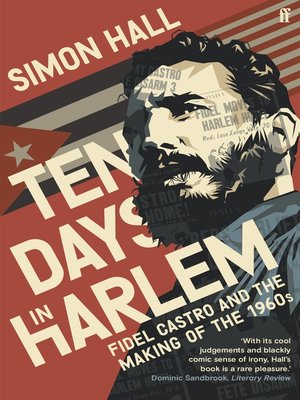
Sign up to save your library
With an OverDrive account, you can save your favorite libraries for at-a-glance information about availability. Find out more about OverDrive accounts.
Find this title in Libby, the library reading app by OverDrive.



Search for a digital library with this title
Title found at these libraries:
| Library Name | Distance |
|---|---|
| Loading... |
Rising star Simon Hall captures the spirit of the 1960s in ten days that revolutionised the Cold War: Fidel Castro's visit to New York. 'With its cool judgements and blackly comic sense of irony, Hall's book is a rare pleasure to read.'
DOMINIC SANDBROOK, Literary Review 'A lively account . . . Ten Days in Harlem doesn't stint on piquant detail.'
LONDON REVIEW OF BOOKS '[A] perceptive, thoroughly researched and readable study.'
IRISH TIMES New York City, September 1960. Fidel Castro - champion of the oppressed, scourge of colonialism, and leftist revolutionary - arrives for the opening of the United Nations General Assembly. His visit to the UN represents a golden opportunity to make his mark on the world stage. Fidel's shock arrival in Harlem is met with a rapturous reception from the local African American community. He holds court from the iconic Hotel Theresa as a succession of world leaders, black freedom fighters and counter-cultural luminaries - everyone from Nikita Khrushchev to Gamal Abdel Nasser, Malcolm X to Allen Ginsberg - come calling. Then, during his landmark address to the UN General Assembly - one of the longest speeches in the organisation's history - he promotes the politics of anti-imperialism with a fervour, and an audacity, that makes him an icon of the 1960s. In this unforgettable slice of modern history, Simon Hall reveals how these ten days were a foundational moment in the trajectory of the Cold War, a turning point in the history of anti-colonial struggle, and a launching pad for the social, cultural and political tumult of the decade that followed.







